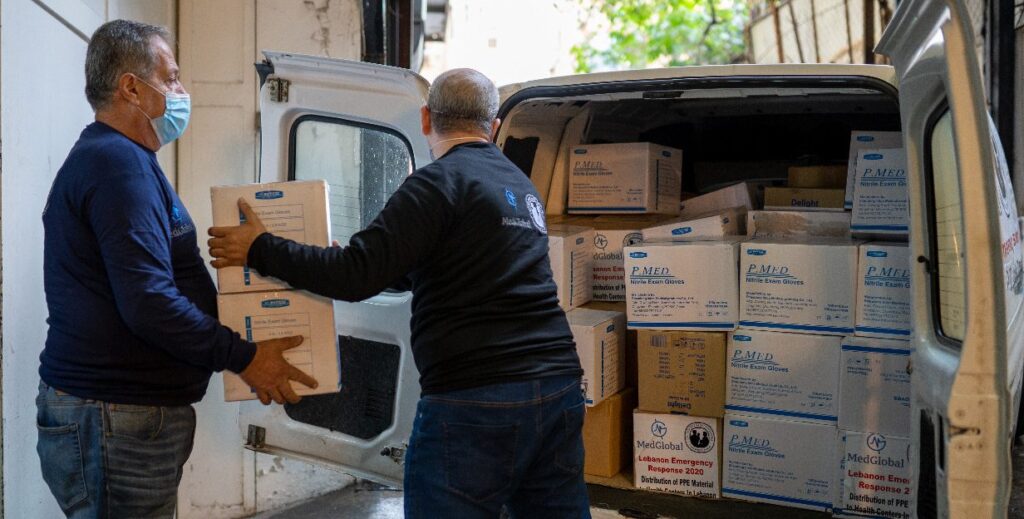Updates & Press
Featured | February 26, 2021
Weekly Humanitarian News Digest – February 2
Author | MedGlobalComms

Each week, we highlight the latest news related to the humanitarian and health crises in our countries of operation: Bangladesh/ Myanmar, Colombia/ Venezuela, Gaza/ Palestinan Territories, Greece, Lebanon, Pakistan, Sudan, Syria, and Yemen. For more frequent updates, make sure to follow us on Facebook, Instagram, and Twitter.
Latest News for February 19 – February 26, 2021
Bangladesh/ Myanmar
India’s coast guard rescued 81 Rohingya refugees, including 23 children, who were adrift in the Andaman Sea after leaving Cox’s Bazar on February 11. Of the 90 refugees that initially departed, eight died and one is missing. The refugees were without food or water and many of the survivors were ill and suffering from extreme dehydration when rescued. India plans to return the refugees to Bangladesh. (Al Jazeera)
Colombia/ Venezuela
Colombia is extending its health state of emergency by three months in order to slow the spread of COVID-19. Colombia has secured deals for 61.5 million doses of COVID-19 vaccine and is in talks to buy 10 million additional doses from Sinovac. The country has so far administered 66,000 vaccine doses to health workers and people over the age of 80. (Reuters)
Gaza/ Palestinian Territories
Gaza has begun a COVID-19 vaccination campaign after receiving 22,000 doses of the Sputnik V vaccine. Health workers will receive the first vaccines, followed by patients with chronic conditions and people over the age of 60. The initial 2,000 doses were donated by the West Bank and the remaining 20,000 were donated by the UAE. Gaza health officials say that they need 2.6 million doses to vaccinate everyone over the age of 16. (Reuters)
Greece
A 26-year-old, pregnant asylum seeker set herself on fire in Kara Tepe camp on Lesvos island after her request to relocate to Germany was denied. The woman survived and was released from a hospital on Tuesday. The incident has drawn greater attention to the mental health crisis in Greece’s migrant camps that have been described as inhumane and degrading. (Middle East Monitor)
Lebanon
The World Bank has threatened to end funding for Lebanon’s COVID-19 vaccine program following violations of its agreement with the government. Lebanon has received nearly 60,000 vaccines as part of a $34 million program by the World Bank. An estimated 17,000 people have received their first dose of vaccine, including several government workers and members of parliament who were not officially included in the first phase of the campaign. (Al Jazeera)
Pakistan
According to a recent poll, nearly half of all Pakistanis surveyed do not want to receive COVID-19 vaccinations. An overwhelming majority said that they would refuse to take vaccines made by the United States, Russia, or China. Additionally, 57% of respondents said that they believed the COVID-19 threat was exaggerated (Gallup Pakistan)
Sudan
An estimated 7,000 Ethiopian refugees have crossed into Sudan’s Blue Nile State after fleeing violence in Ethiopia’s Benishangul Gumuz region. Many of the refugees are in hard-to-reach areas along the border, but nearly 3,000 refugees have been registered and humanitarian assistance is being provided by UNHCR and other groups. The displacement is unrelated to the conflict in Ethiopia’s Tigray region that has forced 61,000 Ethiopians to enter Sudan in recent months. (UNHCR)
Syria
Syrian health workers should begin receiving COVID-19 vaccinations next week. The Syrian Ministry of Health has yet to clarify the number, type, and source of the doses it has received. Syria will also begin receiving vaccines through the COVAX program by the end of March. Initial supplies will cover 3% of the population with hopes to deliver enough doses for 20% of the population by the end of 2021. (Arab News)
The International Rescue Committee has ranked Syria #3 on its list of countries most likely to experience a worsening humanitarian crisis in 2021. Syria was the deadliest country for aid workers with both the highest number of attacks and fatalities in 2019 and 2020. The ongoing conflict, COVID-19, and the economic crisis has caused fuel shortages and record-high food prices, forcing 9.3 million Syrians to grapple with food insecurity. (International Rescue Committee)
Yemen
The UN warns that escalating conflict in Yemen’s Marib governorate may cause new waves of mass displacement. Marib currently hosts more than 800,000 internally displaced persons, many living in areas lacking access to water, electricity, and health services. The UN is calling on all parties in the conflict to de-escalate the violence and allow humanitarian workers to access populations in need. (UN News)


